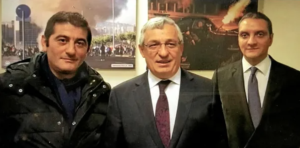Zekeriya Çelikbilek, a Turkish man convicted in Belgium for his involvement in an assassination plot against Kurdish politicians, is living freely in France, raising questions about his potential connections to French intelligence, as reported by journalists from Le Point magazine on Tuesday.
On 2 April, Belgium’s Appeal Court sentenced Zekeriya Çelikbilek and another for plotting against Kurdish politicians. However, as reported by the French magazine Le Point, Çelikbilek, residing in Reims, France, has seen no change in his daily life or legal status in France.
The case involves Çelikbilek’s participation in a 2017 plot against KONGRA-GEL* co-chair Remzi Kartal and Kurdistan National Congress** (KNK) Executive Council member Zübeyir Aydar.
The gravity of the situation is further underscored by France’s continuation to deport Kurdish refugees, including the recent deportation of Mehmet Kopal to Turkey on Tuesday. Upon his arrival, Kopal was paraded on Turkish television by the Turkish police, a move criticised by the Kurdish Democratic Council of France (CDK-F).

The Le Point report suggests that social media posts had already hinted at Çelikbilek’s connections, particularly with İsmail Hakkı Musa, the former Turkish ambassador to Paris and ex-deputy head of MİT, the Turkish intelligence service. However, the leniency observed from the French government and witness testimonies suggest that Çelikbilek might also have ties to French intelligence.
French journalists report that during an interrogation, Çelikbilek confessed to collaborating with unspecified agencies, in exchange for information about the Turkish community in France, which secured him a residency permit. Additionally, another figure within the Turkish network, known as “Little Bird,” corroborated Çelikbilek’s cooperation with French services during an encounter with the anti-terrorist sub-directorate of the judicial police (Sdat).
According to lawyer Jan Fermon, Çelikbilek is likely to have had a role in the 2013 triple assassinations in Paris***, since he boasted about his involvement to a Belgian he attempted to recruit. “His connections to the Turkish state are obvious,” Fermon says.
Despite being interrogated multiple times by French authorities, no action has followed the Belgian court’s ruling, leading the Belgian lawyer to point his finger at politicians who “do nothing”.
“Was there pressure from a closely allied country?” the Brussels attorney asks, further emphasising the role of France.
* KONGRA-GEL, initially known as the People’s Congress of Kurdistan (KADEK), was established as the legislative assembly and one of the main components of the Kurdistan Communities Union (KCK), an umbrella organisation encompassing various Kurdish groups including the PKK (Kurdistan Workers’ Party). KONGRA-GEL aims to represent and unify Kurdish people and their political movements across different regions, primarily focusing on Kurdish rights and autonomy within Turkey, but also addressing the interests of Kurds in Syria, Iraq and Iran.
** Kurdistan National Congress (KNK) is a political platform that aims to provide a unified voice for Kurds from all parts of Kurdistan and the diaspora. Established in 1999, the KNK seeks to advocate for Kurdish rights and freedoms on an international level. It works towards the peaceful resolution of the Kurdish issue within Turkey, Iraq, Iran and Syria, promoting democratic and diplomatic solutions. The KNK acts as a broad-based organisation, including representatives from various Kurdish political parties, organisations, civil society groups and independent individuals.
*** In January 2022, Antoine Comte, the lawyer for the victims of the 2013 Paris assassinations, spoke to Mark Campbell from Medya News, providing deep insights into the prolonged legal battle for justice. The case involves the tragic murder of three Kurdish activists: Sakine Cansız, a founding member of the Kurdistan Workers’ Party (PKK), Leyla Şaylemez, a youth movement member, and Fidan Doğan, a representative of the Kurdistan National Congress (KNK). They were executed in the Kurdish Information Centre in Paris, marking a significant political crime on French soil. The suspect, Ömer Güney, a Turkish national with alleged ties to Turkey’s intelligence services (MİT), died in prison before his trial could commence. Despite this, the case was reopened in 2019 due to emerging evidence, including audio recordings quoted in the Le Point story and investigations that hinted at MİT’s involvement. Comte emphasised the struggle faced in advancing the case, despite it being open for a decade, and criticised the French state’s lack of action and acknowledgement of the political dimensions of the assassination.










